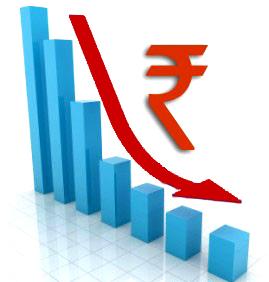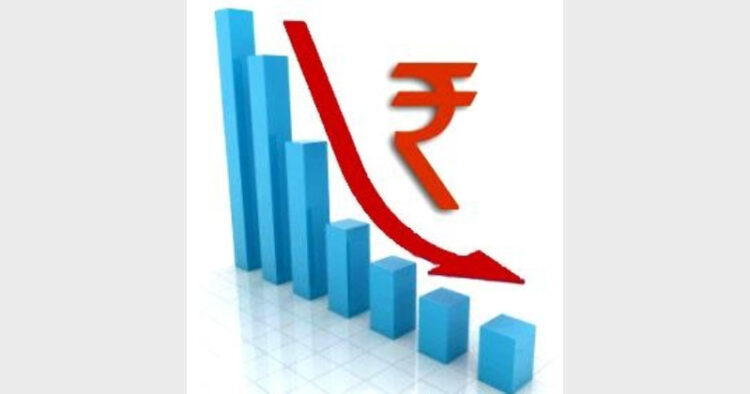Falling Rupee
Dr Ravindra Agrawal
 Finally the Finance Minister P Chidam-baram broke his silence over the continuous fall of rupee against dollar holding the international situation responsible for this phenomenal downfall of Indian currency as the rupee touched its new low at 68.80 per dollar. There is no reason to panic over the situation, he said. Quoting figures and statistics the Finance Minister tried to impress upon the minds of the people that the markets would soon settle down. In reality, are the international situations responsible for the fall in rupee? It appears the Finance Minister, under the cover of statistics, is trying to overlook the real situation developed during the last 5-6 years. This is probably the reason why he is not going into the roots of the problem or could not muster the courage to discuss them.
Finally the Finance Minister P Chidam-baram broke his silence over the continuous fall of rupee against dollar holding the international situation responsible for this phenomenal downfall of Indian currency as the rupee touched its new low at 68.80 per dollar. There is no reason to panic over the situation, he said. Quoting figures and statistics the Finance Minister tried to impress upon the minds of the people that the markets would soon settle down. In reality, are the international situations responsible for the fall in rupee? It appears the Finance Minister, under the cover of statistics, is trying to overlook the real situation developed during the last 5-6 years. This is probably the reason why he is not going into the roots of the problem or could not muster the courage to discuss them.
The Finance Minister, due to political compulsions, might have refrained from discussing weaknesses of the economy, but the Governor of Reserve Bank has plainly said that the situation would take a worse turn due to increasing load of subsidy on Food Security. Obviously, the tendency towards freebies with an eye on political benefits, is detrimental to the economy. The Finance Minister made a provision of
Rs 2,209.71 billion for fertilizers, food and petroleum subsidy as compared to Rs 1,795.54 billion last year. The combined provision for subsidy for these three heads exceeds the provision for defence budget, which is
Rs 2,036.72 billion. This apart, Rs 101.12 billion are earmarked for interest, Haj, pulses and edible oil imports and other heads. The State Governments too do not lag behind the Centre in distributing freebies. The Governments have to borrow from the markets for this and also pay interest on these borrowings. This year the Finance Minister has made a provision of Rs 3,706.84 billion towards payment of interest and loan. The expenditure in this account is increasing every year. In 2007-08, 38.9 per cent of total revenue was spent under this head. This year this figure is expected to be at 42.7 per cent.
In March 2012 the foreign debt was $345.3 billion or Rs 1,7653.33 billion. By March 31, 2013 it shot up to $390 billion with a major chunk of short term loans that has to be repaid within a year. In addition to this, the domestic loan, which stood at Rs 48,668.29 billion, is expected to shoot up to Rs 54,686.22 billion by March 31, 2014 registering an increase of Rs 6,018 billion. Government can justify this by saying that this is not a very staggering figure in proportion of the GDP. But at the repayment of loan front this pressure is exerted on the rupee and the coming generations will be the most sufferers. It may be mentioned that when India attained freedom there was no loan and rupee was at par with US dollar.
The main reason of present devaluation of rupee is the rise in trade deficit which increased 14 times than it was in 2003-04 when the NDA was in power. In 2003-04, it was $13.71 billion. But it increased to $189.76 billion in 2011-12. It has doubted since 2008 and rising continuously. It all shows our exports are low as compared to imports.
This deficit is compensated by short term loans from the foreign countries. Main imports in India include Petroleum products and coal (38 per cent), gold, silver and precious stones etc. (15 per cent) and electronic goods (6.5 per cent). Though the Government tried to control the import of gold, the efforts have failed to yield desired results. The main reason behind this appears to be attraction of gold, which has now become an investment avenue. If the Government were to control gold imports it would have to make available alternate investment avenues to the people.
The country has to import coal because the mining has not yet started in majority of the coal blocks allotted by the Government in last 8-9 years adversely affecting the power generation and industries. They are compelled to import coal at higher prices. This in turn is exerting pressure on foreign currency and affecting the industrial growth. Since some time, the production of natural gas has not been up to the desired target. This fall in gas production has forced to import costly gas. These two factors have raised the Current Account Deficit (CAD) affecting the value of the rupee.
It is often argued that we have to import almost 80 per cent of our petroleum and gas, which involves a lot of foreign currency expenditure. But it is ignored that we pay for the domestic crude oil and gas in foreign currency at par with the imported oil. Why this is so? Are we paying the farmers for their produces in foreign currency? Paying in foreign currency for the domestic oil entails pressure on value of rupee and influences the consumer. The consumer pays for the deficit while the producers earns profit. In spite of the devaluation of rupee in international market, the oil producers are reaping benefits. This discrepancy needs to be corrected.
The import statistic revealed that in last few years we have imported goods that are not indispensable. In 2012-13, we imported apples worth Rs 1,152 crore, cashew nuts worth Rs 5,433 crore, almonds worth Rs 2,105 crore, chocolate worth Rs 172 crore, cosmetics worth Rs 2,173 crore, cameras worth Rs 1,880 crore, locks worth
Rs 400 crore, mobile phones worth Rs 5,135 crore, toys worth Rs 1,232 crore, smart cards worth Rs 1,439 crore, videophones worth 5,135 crore, watches worth Rs 1,236 crore, spects worth Rs 366 crore, tv sets worth
Rs 3,411 crore and cars worth Rs 2,975 crore. The industrialists and businessmen made a fervent appeal to the Prime Minister to put effective brakes to such unnecessary imports but in vain. On the other hand the Finance Ministry has said that import duty on such unnecessary items will not be increased as has been done in case of gold and silver imports. Why? Is it because the Government does not want to put the 10 per cent higher class consumers in difficulty by raising the import duty on these luxury items?
It seems that the Government is following a two-pronged strategy in this election year. One, they do not want to disturb the high class consumer, and two, earn the goodwill of 66 per cent population by way of food security. The country is well aware of the fact that the present Public Distribution System (PDS) could not stop the theft of food grains meant for distributing among the poor and BPL families. Instead of making this system fool-proof, the food security would prove useless.
The Government, time and again talks of increasing foreign investment for a stable rupee. It also says that the country is importing 1,000 ton gold. It is a common knowledge that people have money to pay for gold even after paying 10 per cent import duty. Why the Government has not come out with an effective and attractive investment scheme to invest this money in productive activities in the country? This will not only lessen the pressure on rupee but also increase the job opportunities, production and growth rate.
Protect national interests in Bali: SJM
Swadeshi Jagran Manch (SJM) warned the UPA Government not to compromise the national interest in WTO and said no discussion should be allowed on any new issue, whatsoever, unless developed countries do not withdraw their agricultural subsidies.
This warning came from the SJM working committee held from August 17 to 18. The 9th WTO Ministerial Conference is scheduled in Bali (Indonesia) between December 3 & 6, 2013. We must note that after 4th WTO Ministerial Conference at Doha (Qatar), a new round of negotiations in the name of ‘Doha Development Round’ was expected to start.
The SJM said that the multinational corporations baffled by the developments like issue of compulsory licences by the Indian patent office and denying of patent to Novartis for its drug ‘Glivec’ are now making efforts through their respective governments to effect changes in Indian patent law in their favour. People need to be extra vigilant for the same, as the government may fall prey to this ploy. We also need to exert pressure on the developed countries that they allow unrestricted flow of unskilled labour across the countries. “Swadeshi Jagran Manch firmly believes that a government, which is at the verge of completing its term, does not have any moral right to make any international agreement or make any commitment at any international forum. Therefore, government should resist from making any agreement or commitment, which may create problems for the next government,” said a statement issued by the SJM. The statement further said in the last few months, under the influence of USA, Government of India has shown dilution in its earlier stand. This would be disastrous for not only agriculture and dairy sector, industry and service sector will also be badly affected due to it.
—Bureau Report
?













Comments